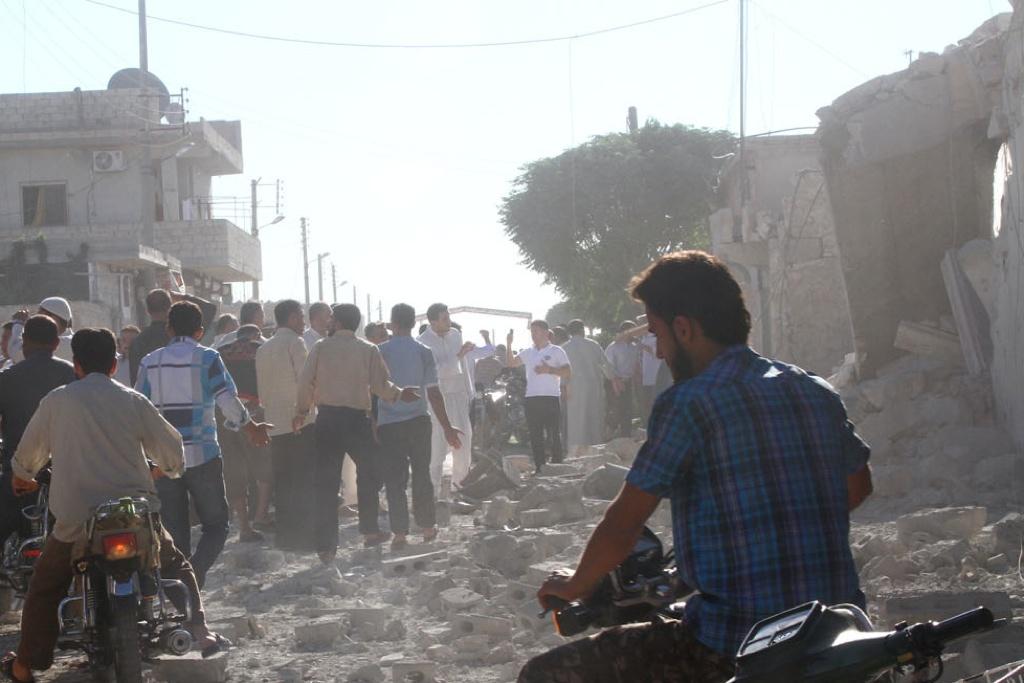Holidays in Syria
Crowds begin to flee as a fighter jet returns for a third bombing raid in the suburb of Mara, on the outskirts of Aleppo, over the Edi al-Fitr holiday.
MARA, Aleppo – On the last day of Eid al-Fitr, the celebration that marks the end of the fasting month of Ramadan, this town awoke not to the call to prayer, but to the sound of a falling rocket.
Everyone's doors and windows rattled, and shrapnel rained down outside. For this village on the edge of Aleppo, Syria's second-largest city and the scene of the regime's latest offensive against rebel forces, bombardments like this occur almost daily.
After the first explosion, Rafah al-Huseni, 29, rushed to opened the doors and windows. Her mother darted back from the outside toilet, adjusting her clothes as she ran. Her hands shook as she removed debris from her hair.
“We must open the doors and windows or they will blow apart in the explosion,” said al-Huseni, who is 3 months pregnant. She is a veteran of air raids, having lived in the embattled city of Homs for most of the Syrian revolution.
More from GlobalPost: UN observers evacuate Syria
In Syria, the three days of Eid are usually filled with celebration, gifts, elaborate meals and visits with family and friends.
“We didn’t buy anything new for Eid, no new clothes, no gifts for the children — you see now they are dropping the gifts from Assad on us from the sky,” al-Huseni said, referring to Syria's president, Bashar al-Assad.
As the sound of the jet aircraft again roared above, al-Huseni explained: “This is a MIG-21. Today it’s dropping the 500 kilogram bombs, not just the bullets like last night.”
A second explosion rocked the neighborhood as cries of Allah Akbar echoed through the streets.
At the scene of the impact, four houses were destroyed. A man covered in blood said several children had already been rushed to the Turkish border for treatment.
As the roar of the plane returned yet again, the crowd that had gathered to survey the damage ran for cover.
Outside the nearby field hospital, a woman with tear-filled eyes held a young boy on her lap, a look of hopelessness on her face.
More from GlobalPost: Complete Coverage from Inside Syria
Inside the makeshift, badly damaged hospital, a doctor, assisted by two civilians, tried to revive a man with antiquated, failing medical equipment. In the next room, a young boy gasped for breath through horrific facial injuries. Another man sat alone on the floor attempting to stop blood streaming from his head. An old woman cradled a heavily bandaged arm as an eighth patient stumbled through the door, another elderly woman.
One block from the impact, al-Huseni, along with the women and children of three families, gathered in the central room of their temporary, communal home. The men are members of the Free Syrian Army and only return from the fighting about once a week to check on their families.
Al-Huseni and her mother came here after government soldiers confiscated their house in Homs about five months ago to use as a sniper post. They said they were forced to flee with nothing but the clothes they wore. Now her husband fights with the rebels for control of Aleppo airport, where he once worked as a fighter pilot in Assad’s army.
“In Syria there is no Eid,” al-Huseni said. “My husband and my brother are out there fighting. People are dead and injured all around us. How can we celebrate? There is no happiness.”
The children seemed oblivious to the mornings chaos as they watched a group of kids clap and sing “Happy Eid” on television. An announcement sounded from the mosque speakers calling all to prayer for Ahmed, the “martyr of today's attack.” The young man from the field hospital did not survive.
More from GlobalPost: Not everyone hates Bashar al-Assad
“Assad’s soldiers ran away because they can’t fight face-to-face. They are very weak, so they attack only from a distance. They are strong only from a plane or behind a tank,” al-Huseni said.
“Last Eid in Homs it was very bad,” recalled another in the group who was afraid to be named. “We couldn’t go in the street at all. Always there was bombs and killing. In Homs it never stops.”
Back on the Turkish border, thousands of families continued to flee from towns like this.
A few nights before, about 3,000 people gathered in a dry field by an improvised border pass. Beams of torch light from the young rebel soldiers guarding the post scanned the dark fields, revealing hundreds of families surrounded by their few belongings. Some families attempted to assemble a final Ramadan meal on the ground of the dusty field. It had been a long hot journey with no food, water or cigarettes allowed before nightfall.
“Everyday it’s the same,” said Mohammed al-Badar, who helps coordinate free transport for refugees and wounded fighters. “Today it is even sadder to see so many of my people homeless. Tomorrow is a day of celebration for Muslim people, but look at all these families. What do they have to celebrate?”
